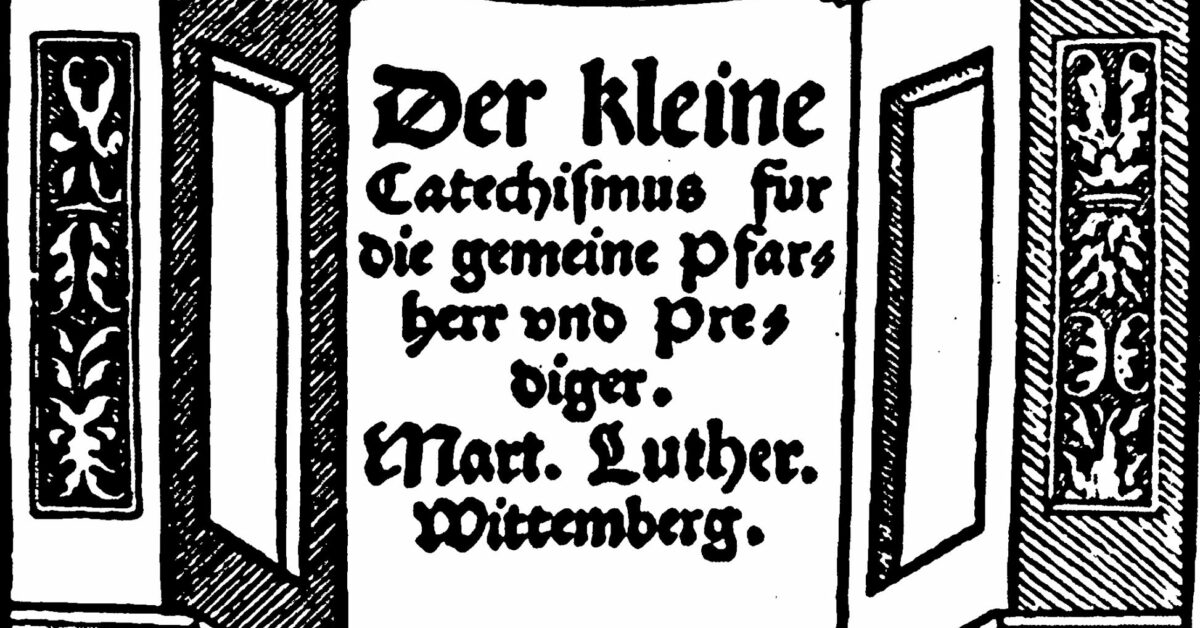Resources on Luther’s Small Catechism
It’s back. My neighbors have decorated their yards and porches for the “high holy day” of Halloween: Huge spiderwebs with big, scary spiders, orange strings of lights on porches, and ghosts fluttering in tree branches abound. As I observe these decorations on my morning walks during this brisk fall weather, those who encounter me see another symbol of this season: Luther’s seal and the words “Confirmed Lutheran” in large letters on my sweatshirt.
To commemorate the Lutheran Reformation, a review of some sources on Luther’s Small Catechism seems most appropriate. Here are four publications:
Praying Luther’s Small Catechism by John T. Pless, CPH, 2016.
https://www.cph.org/p-30433-praying-luthers-small-catechism.aspx
A more “scholarly” book than the others—based on the number of endnotes and wide use of other confessional documents—Pless’s book is divided by the six chief parts. Each subsection within the chapters quotes a section of the catechism followed by a prayer and extended commentary on that section, drawing on other writings of Luther and the works of Luther scholars. Pless himself says in the preface, “This book that you now hold in your hands might be thought of as an exercise in prayed dogmatics.”
Mark Mattes from Grand View University, Des Moines, IA, wrote this synopsis for the book jacket: “Giving voice that the Catechism not only teaches true doctrine but also Christ-centered spirituality, John Pless reminds us that the Catechism was designed not only to be taught but also to be prayed. Many find prayer challenging because they have a hard time focusing. This book not only offers model prayers grounded in the Catechism, but shows how the Catechism itself can structure the life of prayer and so help those who are easily distracted in prayer. Sound doctrine, consistent practice, pastoral wisdom, all held together by a passion for the Gospel, constitute the richness of this book.”
Praying the Catechism by Donald W. Johnson, rev. ed., ELIC, 1998. Used copies available at https://www.amazon.com/Praying-Catechism-Donald-W-Johnson/dp/B003AOWBB4/ref=sr_1_1?dchild=1&keywords=Praying+the+Catechism+by+Donald+w.+johnson&qid=1634241667&sr=8-1
As a “devotional” writing, this publication is more practical the Pless’s volume and more open-ended than Harrison’s. In the introduction Johnson describes the book as “an attempt to help restore the Catechism into the prayer room. It invites you to experience its parts through a journey of prayer and meditations. Along with the Catechism, passages of Scripture and the liturgies of Baptism and the Eucharist are used as a starting point for some meditations.” Each section gives several prompts to “pause and reflect,” such as this one from the Fourth Commandment: “At times there is so much abuse, so much neglect, so much isolation and so little help within a family. If you have grown up with this, it is hard to honour. You will not honour by keeping things hidden. God’s healing comes in the midst of facing the truth.” In the next suggestion to “pause and reflect,” Johnson speaks to those whose parents “have been loving, caring, and supportive” and invites the reader to take time to give thanks. Each section closes with suggested intercessions on behalf of others.
A newer edition, with excerpts from liturgies in ELW is available through Augsburg Fortress. https://www.augsburgfortress.org/store/product/9786000123956/Praying-the-Catechism
Thank, Praise, Serve, and Obey: Recover the Joys of Piety by William Weedon, CPH, 2017. https://www.cph.org/p-31340-thank-praise-serve-and-obey-recover-the-joys-of-piety.aspx
Unlike the other three volumes reviewed here, Weedon’s book is not organized according to the six chief parts of the catechism but according to seven “godly habits” named in the chapter titles: “Faithful listening to the Word of God,” “The Daily Prayers,” “Frequent and Faithful reception of the Eucharist,” etc. Weedon asserts that “the habits we will explore in this book foster a joyous freedom from” that “fatal ‘bend in one’s self’” of original sin. These habits turn our attention “toward God and His promises, and toward our neighbor in love and charity for her or his needs” (viii). He contrasts piety with pietism; the former “is simply the cultivation of godly habits” (viii) and “is born and learns to breathe deeply the bracing air of freedom” (x).
A reviewer on Amazon writes, “This book is a refreshing blessing to the reader. It is not about Christian piety as something we do, but rather shows how true piety is receiving, ruminating on, and rejoicing in the gifts that God so generously lavishes upon us in both body and soul.”
Why Am I Joyfully Lutheran? Instruction, Meditation, and Prayers on Luther’s Small Catechism by Matthew C. Harrison, CPH 2018. https://www.cph.org/p-32618-why-am-i-joyfully-lutheran-instruction-meditation-and-prayers-on-luthers-small-catechism.aspx
The title accurately describes what Harrison does in the 35 chapters, each of which begins with a section of the catechism and Luther’s explanation, a brief Scripture passage, and a devotional meditation. Each chapter closes with a section titled “Why am I joyfully Lutheran?” Included here is one paragraph relating this catechetical section to joy, followed by prayers addressed to Jesus reminding the reader of God’s instruction, offering thanks for Christ’s redeeming work, and closing with words of confession. In the foreword Harrison describes this pattern as that of Luther, based on his pamphlet “A Simple Way to Pray” (AE 43:189-209).
Chapters that include the longer sections of the catechism (articles on the creed, Q & A on the sacraments) subdivide Luther’s explanation, and Harrison offers commentary on each subsection with a plethora of Scripture quotations.
A penultimate word: Both Pless and Harrison reference Albrecht Peters’ Commentary on Luther’s Catechisms as a resource. This five-volume work is available through CHP.
May we commemorate the Reformation with prayers of repentance, thanksgiving for God’s love revealed in Jesus Christ, and joyful service on behalf of our neighbors in need.
